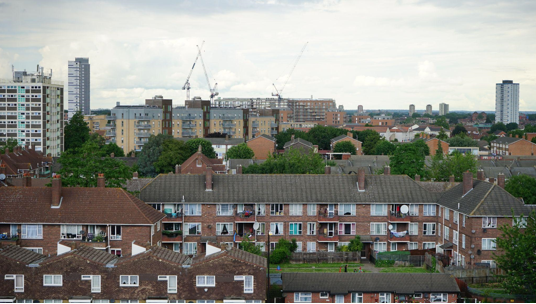 By John Palliser
By John Palliser
December 5th, 2022
BURLINGTON, ON
A buyer or a new investor, waiting to make their first ever property purchase, has one concern; “how much do the prices fall during the recession in Canada?”
With the financial crisis that Canadians faced in 2008, followed by the harsh times during 2020 (due to the pandemic), people are concerned about their finances more than ever.
Investors, who have had real estate holdings in their portfolio have been concerned about this as well. If the current economic condition persists, i.e. recession, how will it impact the housing market?
Moreover, if the situation resolves but a recession hits back within the next 6 months, what shall one expect? An assessment of the situation is crucial, to develop strategies that can help the housing businesses and investors sustain through these times.

Recession affects the prices of the housing market by an average of about -10.0%.
You can look at different predictions by financial experts. But predictions without data are not worth it and have no value.
According to the data of the previous years, it is concluded that recession affects the prices of the housing market by an average of about -10.0%. Moreover, the prices of the nominal houses also decreased by almost -14%.
Setting aside the 2020 time period, as it was a global health emergency, if we assess the condition of the housing market during the recession; it has had a very negative effect overall.
A Recession impact homeowners wealth in Canada
Housing prices fall during recessions. In the worst cases, according to strawhomes.com your home’s value could drop 25%.
But Not necessarily.
Canada’s housing market has been less volatile. Since 2008-09, the housing market has recovered well. Home prices are near 2008 highs. Housing starts aren’t meeting demand.
Rising interest rates force home buyers to save for mortgage payments. Mortgage lenders are warier. This could affect consumer loans and credit card debt.
With more renters, prices rise. Consumers may reduce spending to avoid debt, hurting the real economy.
Western Canada housing prices have been strong for a decade. Recent years have seen new competitors. Recession and falling commodity prices caused a correction.
2008 Canadian Housing Market Recession
Canada avoided the worst of the last recession. A more regulated, government-backed financial system helped housing consumers weather the crisis.
Housing has recovered. Prices are near 2008 highs. The economy is still struggling. In coming years, the economy will slow. The Bank of Canada expects a recession in Canada in 2022.
Housing prices contribute to negative wealth, according to the Bank of Canada. This will reduce GDP growth by 2.5%. Low borrowing costs also fuel pent-up demand.
The Canadian Mortgage and Housing Corporation predicts a 5% drop in home prices by mid-2023. Model includes scenarios. Worst case, prices drop 25%.
Canadian recession may crash housing market. The recovery is strong but temporary.
Will a recession drive down house prices?
The Canadian housing market is affected by several factors. Near-record home prices. Recessions change the housing market.
Recessions lower home prices. Increased home sales are expected. Increased foreclosures. This means fewer buyers and longer listings.
Interest rates rise during a recession. This will make mortgage payments harder. If you’re considering buying a home, you should know the costs involved.
Home buyers need a stable job. Unstable employment can make a cheap home purchase difficult.
High unemployment marks recessions. Recessions increase foreclosures. This can create more affordable homes.
Rising rates can also lower home prices. The Bank of Canada is hawkish amid high inflation.
Now, based on the data collected through the previous recessions, can we understand the impact it will have in future recessions? Yes. As of now, experts state that future recessions can impact the market till a -24.2% decline and a nominal decline of 11.7% can be experienced. The best scenario that the investors or anyone in the market can pull off, would be 12% real appreciation and 9% nominal appreciation.
Although we cannot and should not make decisions based on uncertain happenings, preparing for the worst case situation is always a smart choice to make. Planning a risk management strategy for the recession period can be extremely helpful and therefore, understanding the impact recession has had in the previous scenarios is important.
Should I Buy a House in a Recession in Canada?
During a recession, buying a home can be difficult. Before deciding, weigh the pros and cons.
The recession isn’t a one-time event. Unemployment will rise in the coming years. Recessions reduce home buyers, lowering prices.
Recessions lower interest rates. Prime rate is 0.25 percent, which can help you get a better mortgage rate. This can lower prices and boost ROI.
Recessions make lenders tighten loan requirements. This lowers default risk. Home buyers can rejoice.
If you’re buying a home, check your credit. You’ll want a stable job before moving. You should also know how much home ownership will cost. Including down payment and closing costs.
Interest rates are still rising
Canada’s interest rates are rising despite recession fears. The Bank of Canada is trying to control inflation. They’re raising rates by a half-point. This may be the beginning, depending on the economy.
Canada’s rising rates are cause for concern. They affect savings, investment, and borrowing rates. They can slow the economy. If inflation rises, Canadian wages may fall.
Higher interest rates cause higher inflation, says the Bank of Canada. It’s important to monitor how these changes affect your savings and investments. Avoid making large purchases.
The BoC aims for 2% inflation. The bank may take stronger action if inflation rises. If inflation falls, the Fed won’t need to raise rates further.
Home Prices Fell At The Fastest Rate Ever in 2022
During Canada’s 1990s housing boom, prices soared. Rich people with mortgages wanted bigger homes as prices rose. Low rates fueled the boom. Sub-prime mortgage crisis caused 2008 financial crash.
Canada is recessionary. Most of Canada’s major cities are seeing falling home sales, according to CREA. Housing market stabilization will slow the decline.
Rising interest rates are cooling Canada’s frothy housing market. Vancouver, Toronto, and Montreal have cooled. Increasing interest rates limit affordable housing in the GTA, where the 30-year fixed mortgage rate hit a 20-year high in late October.
September GTA home prices fell 3.0%. Toronto’s benchmark home price is C$1.12 million. Still 7.7% above last year.
Will the housing market crash if there’s recession?
You need to know how a recession will affect your real estate investment, whether you’re a first-time buyer or a seller. Recessions can lower demand and prices. Recessions can affect interest rates, making it hard for home buyers to afford mortgages.
The economy is the biggest predictor of recession home effects. A recession is a slow economic decline that hurts consumer spending. Slowing growth will raise interest rates.
Market supply and demand can also predict a crash’s effects on your home. When supply is low, home buyers drop. This won’t crash a healthy market. When demand drops, sellers must lower prices to sell.
CMHC and OECD reported on house prices during four recessions. The worst-case house price crash scenario is a 25% drop.

Market supply and demand can also predict a crash’s effects on your home
Recession or a coming financial crisis?
Investors must stay calm during a recession or financial crisis. Large-scale economic imbalances cause most recessions.
Recessions last 2-18 months. They can last years, affecting consumer confidence, stock prices, credit scores, and unemployment.
The Federal Reserve will tighten monetary policy aggressively. Inflation and economic growth are expected to rise. The effects will hit U.S. consumers and businesses.
Two-thirds of economists predict a recession in 2023, per the Financial Times. IMF forecasts global recession.
IMF Economic Counsellor Pierre-Olivier Gourinchas says the US faces a global recession. War in Ukraine, a pandemic, and China’s economic slowdown are major causes, he says.
A recession is two or more consecutive quarters of declining GDP, according to the NBER. Recessions last between two and 18 months, according to experts.
Conclusion
To conclude, the longer the recession period, the more the economy suffers. As investors, it is critical that you develop strategies to mitigate risks and manage the recession period efficiently.



















I read in The Star up to 25% will need to sell their home with interest rates rising. I gather there could be many foreclosures on the horizon, especially new home owners that took on a large mortgage. It’s unfortunate, but home prices need to come down significantly these next few years so average folks can buy a home. This article doesn’t take in other variables on supply increasing from provincial side nor shutting door to foreign investors.